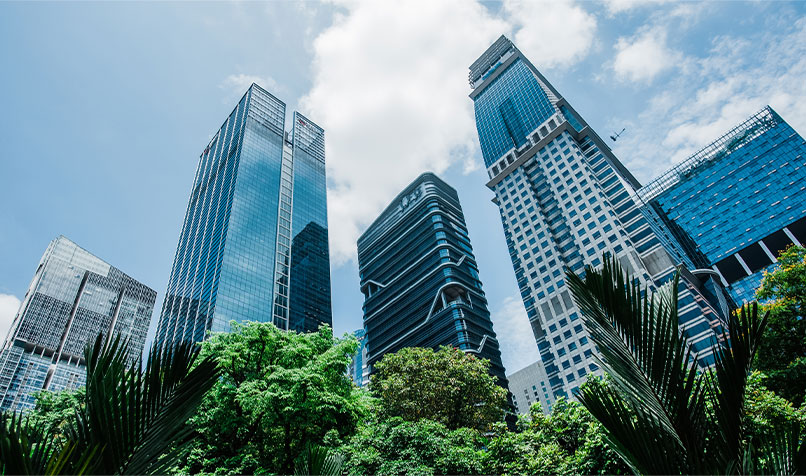Loading component...
At a glance
Themed as “Building Our Shared Future Together”, the budget [PDF] has something for everyone as it aims to ease pressure on households and business while maintaining a responsible fiscal outlook.
“I know that many households are feeling the pressure of higher living costs,” Wong, who is also Singapore’s deputy prime minister, says in his budget speech.
“There are many pressures for us to spend more, be it on healthcare, social needs, or the energy transition, and these are all big-ticket items.
“The medium-term fiscal position is tight… [but] we are cautiously optimistic that 2024 will be a better year.”
Singapore’s government expects to end the 2023 financial year with a deficit of S$3.6 billion, or 0.5 per cent of the GDP. The government is forecasting a "small surplus" of S$0.8 billion - or 0.1 per cent of GDP for this financial year.
This, Wong notes, is "essentially a balanced fiscal position”.
“On the whole, we are cautiously optimistic that 2024 will be a better year,” he adds. “Besides lower inflation, we expect higher GDP growth at 1.0 per cent to 3.0 per cent.”
Key takeaways from Singapore’s budget 2024
- S$1.3 billion support for business, which includes all companies with at least one employee in 2023 receiving a S$2000 cash grant and being eligible for a 50 per cent corporate income tax rebate, capped at S$40,000
- Introduction of a fully refundable investment credit for qualifying expenditure on eligible projects
- A S$2 billion top-up to the Financial Sector Development Fund
- More than S$1 billion investment in AI over the next five years
- S$5 billion for new Future Energy Fund to help Singapore's transition to cleaner fuels
- The government will proceed with elements of its BEPS 2.0 agenda targeting the taxation of MNEs
- Nationwide Broadband Network upgrade to enable mass market access to broadband speeds 10 times faster than today
- S$3 billion set aside for R&D in the Research, Innovation and Enterprise 2025 (RIE2025) plan
- S$1.9 billion in cost-of-living relief measures, including support for households and seniors.
Tax changes to target multi-national enterprises
The government will proceed with two components from the second pillar of the Base Erosion and Profit Shifting (BEPS) 2.0 framework.
The first is the income inclusion rule, which means that multi-national enterprises (MNE) groups parented in Singapore will have to pay a minimum effective tax rate of 15 per cent on their groups' overseas profits, regardless of where they operate.
Similarly, the domestic top-up tax will also be activated, allowing the government to collect tax on profits from MNE groups operating in Singapore.
These two components will take effect for businesses' financial years starting on or after 1 January 2025. This will apply to MNE groups with an annual global revenue of at least €750 million.
Furthermore, the government announced it will consider whether to introduce the undertaxed profits rule at a later stage. If this rule proceeds, it will allow Singapore’s government to collect a share of the top-up tax on any MNE with operations in Singapore, if any portion of its income overseas has not been subject at the minimum tax rate.
Support for business in Singapore

For corporate Singapore, the budget dished out large-scale support across the board, including a 50 per cent corporate income tax rebate (capped at S$40,000) for all companies.
As part of this rebate, there will be a S$2,000 cash payout for companies that employed at least one local employee in 2023. This payout will be automatically distributed to qualifying companies by the third quarter.
This means that all employing companies in 2023 will receive a payment from the government, regardless of whether they are in profit or not.
To encourage more investment into Singapore, the government announced the creation of a Refundable Investment Credit (RIC). The RIC will be designed to support investment in high-value economic activities such new innovation and R&D activities, and activities supporting the green transition.
Companies that meet criteria determined by the Economic Development Board (EDB) or EnterpriseSG, will receive up to 50 per cent support on each qualifying expenditure category, such as capital expenditure and labour costs. The credits will be offset against corporate income tax payable, with any unutilised credits refunded to the company in cash.
In addition, the government will also enhance the Enterprise Financing Scheme, with the maximum working capital loan quantum permanently raised from S$300,000 to S$500,000.
The government will also support its National AI Strategy 2.0 by investing more than $1 billion over the next five years into AI industry and talent development. Part of this investment will be used to encourage businesses to set up their AI centres of excellence in Singapore.
Singapore will also invest to upgrade its Nationwide Broadband Network to enable mass market access to broadband speeds of up to 10 gigabits per second. This would be 10 times faster than the broadband speeds available in most homes today.
Assistance for cost-of-living pressures
There was plenty in the budget for people struggling with cost-of-living pressures. This included S$8.2 billion in support for those in their 50s and 60s through bonuses.
Additionally, there’ll be a new national program at a cost of S$3.5 billion, dubbed Age Well SG.
More broadly, every Singaporean household will receive S$600 in Community Development Council (CDC) vouchers. There will also be a Cost-of-Living Special Payment of between S$200 and S$400 for lower income earners, as well as assistance for Housing & Development Board (HDB) households in paying utility bills and Service and Conservancy Charges (S&CC).
Furthermore, there will be a 50 per cent personal income tax rebate for taxpayers for the Year of Assessment 2024, capped at $200.
All Singaporeans aged 40 and above will receive a S$4,000 SkillsFuture credit top-up in May this year. They will be able to use this credit to help pay for selected training programs, including part-time and full-time diplomas, post-diplomas, and undergraduate programs.
Reactions to Budget 2024
Cheung Pui Yuen FCPA (Aust.), Singapore Divisional President, CPA Australia and Reputation and Risk Leader, Deloitte Southeast Asia
“Singapore Budget 2024 is a balanced one that provides assurance and opportunities to all stakeholders, from businesses, workers, community groups, families to individuals to help them navigate challenges and strengthen cohesion.
“Indeed, this first installment of the Forward Singapore programs shows the government’s commitment in providing concrete ways to forge a path that is resilient and sustainable, for a better future and a stronger Singapore.”
Greg Unsworth FCPA (Aust.), Singapore Divisional Deputy President, CPA Australia, and Digital Business and Risk Services Leader, PwC Singapore
“The government’s plans to invest over S$1 billion in artificial intelligence over the next five years further reflects the potential that AI, including generative AI, holds in transforming the nation’s economy.
“This investment will help to realise the National AI Strategy 2.0’s outcomes of developing AI talent, industry and infrastructure, all of which need to be underpinned by a trusted environment for AI, where businesses, the government and the broader Singaporean society can continue to experiment with AI, scale it and eventually realise its promise.”
Selena Ling, Chief Economist, OCBC
“The FY2023 budget deficit came in larger than expected despite the buoyant corporate income tax collected mainly due to the S$7.5 billion top up to the Majulah Package Fund. That said, the FY2024 budget will be largely balanced with a S$0.8 billion surplus (0.1 per cent of GDP) penciled in.
“Government spending is still tipped to rise, and the fiscal position will remain tight in the face of the growing healthcare needs of an ageing population amidst a complex and uncertain world.”

